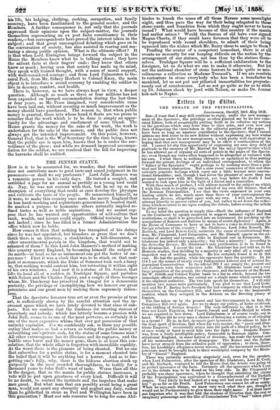THE JENNER STAT LE.
How is it to be accounted for, we wonder, that fine sentiment does not contribute more to good taste and sound judgment in its possessors—or shall we say professors ? Lord John Manners was a romantic person in his early days. He turned a couplet, and scribbled a page for an annual as prettily as a young lord could do. Nay, he was not content with that, but he set up as the champion of everything that could at once develop the physique and cultivate the taste of the people. He consecrated himself, as it were, to make this country once more the merry England that in less hard-working and sophisticate generations it boasted itself. So marked a purpose to humanize others naturally implied re- fined tastes as well as noble aspirations. And we cannot sup- pose that he has wanted any opportunities of self-culture that rank, wealth, and leisure could supply. Official training he has not lacked ; since he has filled in a former Administration the office which now he holds.
How comes it then that nothing has transpired of his doings since he was last appointed, but blunders so gross that we don't think there is an attorney, a stockbroker, a bill-discounter, or other unsentimental person in the kingdom, that would not be ashamed of them ? Is this Lord John Manners's method of making this country merry England, by becoming himself the subject of its mirth—at least so far as amusement can get the better of an- noyance ? First it was a clock that was to be stuck on that cost- liest of monuments, which the Duke of Somerset took such a fancy to, that nothing would content him, but reerecting it within sight of his own windows. And now it is a statue of Dr. leaner, that lifts its head all of a sudden in Trafalgar Square, and partakes with Nelson and Sir Charles Napier, and a couple of those Georges whom Mr. Thackeray has preserved in vinegar for a democratic posterity, the privilege of exemplifying how we honour our great potentates and our great men by making them supremely ridicu-
OWL
That the Spectator honours true art or even the promise of true art, is sufficiently shown by the careful attention and the in- .oreased space which we have lately devoted to that class of sub- jects. But we confess that the fondness for erecting statues of everybody and nobody, which has latterly become a passion with John Bull, seems to us one of the most perverse, as certainly it is one of the most expensive whims that ever got possession of that -unlucky capitalist. For we confidently ask, is there any possible outlay that makes so bad a return as voting the public money or subscribing one's private cash, for the statue of some famous man ? All other extravagance has its illusions and its raptures, and the bubble once burst and the money gone, there is at least this con- *dation, that the whole affair is forgotten with incredible rapidity. At the worst there is the pleasure of being cheated. But no one that subscribes for a public statue, is for a moment cheated into the belief that it will be anything but a horror. And as to for- setting one's folly, why, there is the hideous abortion stuck up _purposely in the most crowded thoroughfares, to testify for a _thousand years to John Bull's want of taste. Worse than al this is the danger, that as the mania for public statues increases, a veto will be put upon greatness of every kind. Difficult it will be no doubt, to control the instincts and the impulses that make men great. But what man that can possibly avoid being a great man, would not court any obscurity and neglect any duty, rather Map. be gibbetted in stone as Peel and Wellington have been in this generation ? Must our sole resource be to long-for some Alci-
biades to knock the 'noses off all those Hermte some moonlight night, and thus pave the way for their being relegated to those stone-yards and foundries from which they ought never to have issued ? What would have become of this country if the mania had earlier arisen ? Would the Barons of old have ever signed Magna Chart-a, if they could have foreseen that they were all to be reproduced with round shoulders, to admit of their being squeezed into the niches which Mr. Barry chose to assign to them! Pending the avatar of a competent iconoclast, there is at all events no necessity for our heaping ridicule on the nation by the arrangement of our statues, not less than by the statues them- selves. Trafalgar Square will be a sufficient exhilaration to the foreigner, let us do what we can to make it otherwise. But let not the national chamber of stone horrors be made quite so mis- cellaneous a collection as Madame Tussaud's. If we are resolute to caricature in stone everybody who has been a benefactor-to mankind, let us not put our pilloried immortalities too preposte- rously out of countenance. Let us not go quite so far as to stick up Dr. Johnson cheek by jowl with Nelson, or make Dr. Jenner hob-nob to Napier.






























 Previous page
Previous page